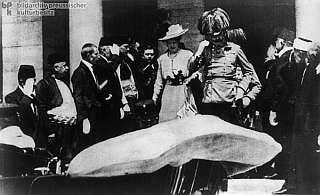
Franz Ferdinand and his wife Sophie leave the Sarajevo Town Hall on 28 June 1914, five minutes before the assassination.
The Good Soldier Švejk is a novel with an unusually rich array of characters. In addition to the many who directly form part of the plot, a large number of fictional and real people (and animals) are mentioned; either through the narrative, Švejk's anecdotes, or indirectly through words and expressions.
This web page contains short write-ups on the people/animals that the novel refers to; from Napoléon in the introduction to Hauptmann Ságner in the last few lines of the unfinished Part Four. The list is sorted in the order of which the names first appear. The chapter headlines are from Zenny Sadlon's recent translation (1999-2008) and will in most cases differ from Cecil Parrott's version from 1973. In January 2024 there were still around twenty entries to be added.
The quotes in Czech are copied from the on-line version of The Good Soldier Švejk: provided by Jaroslav Šerák and contain links to the relevant chapter. The toolbar has links for direct access to Wikipedia, Google maps, Google search, svejkmuseum.cz and the novel on-line.
The names are coloured according to their role in the novel, illustrated by the following examples:
- Dr. Grünstein as a fictional character who is directly involved in the plot.
- Fähnrich Dauerling as a fictional character who is not part of the plot.
- Heinrich Heine as a historical person.
Note that a number of seemingly fictional characters are inspired by living persons. Examples are Oberleutnant Lukáš, Major Wenzl and many others.
Titles and ranks have until 2020 largely been missing on this web page. Senior Lieutenant Lukáš has, for instance, only been known as Lukáš. This weakness is now (24 December 2020) slowly being addressed. Military ranks and other titles related to Austrian officialdom will appear in German, and in line with the terms used at the time. This means that Captain Ságner is still referred to as Hauptmann although the term is now obsolete, having been replaced by Kapitän. Civilian titles denoting profession etc. are in general translated into English.
 People index of people, mythical figures, animals ... (587)
Show all
People index of people, mythical figures, animals ... (587)
Show all I. In the rear
I. In the rear  1. The good soldier Švejk acts to intervene in the world war (30)
1. The good soldier Švejk acts to intervene in the world war (30) 14. Švejk as military servant to senior lieutenant Lukáš (35)
14. Švejk as military servant to senior lieutenant Lukáš (35) II. At the front
II. At the front  1. Švejk's mishaps on the train (22)
1. Švejk's mishaps on the train (22) 2. Švejk's budějovická anabasis (55)
2. Švejk's budějovická anabasis (55) 3. Švejk's happenings in Királyhida (46)
3. Švejk's happenings in Királyhida (46) 5. From Bruck on the Leitha toward Sokal (44)
5. From Bruck on the Leitha toward Sokal (44) III. The famous thrashing
III. The famous thrashing  1. Across Magyaria (52)
1. Across Magyaria (52) 2. In Budapest (32)
2. In Budapest (32) 3. From Hatvan to the borders of Galicia (31)
3. From Hatvan to the borders of Galicia (31) 4. Forward March! (32)
4. Forward March! (32) IV. The famous thrashing continued
IV. The famous thrashing continued  1. Švejk in the transport of russian prisoners of war (35)
1. Švejk in the transport of russian prisoners of war (35) 3. Švejk again with his march company (20)
3. Švejk again with his march company (20)



|
I. In the rear |
 | |
15. Catastrophe | |||
 | Oberst Kraus von Zillergut, Friedrich |  | ||||
| ||||||
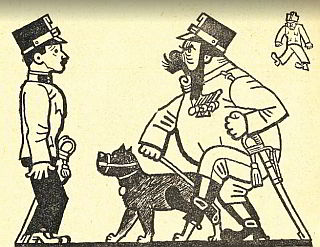
,6.1.1924
Kraus was a colonel at some barracks in Prague (presumably Karlín), he originated from the Salzburg area. He was the owner of the stolen dog Fox (who was named Max for the short period he belonged to Oberleutnant Lukáš).
Kraus was a price idiot and also had plenty of other despicable qualities. He was probably the most stupid of the many officers that are described in the novel. He had a habit of explaining the most obvious things, which drove his colleagues to insanity. Despite of all this he had advanced in the military hierarchy thanks to good connections, a fact the author uses to emphasise the rottenness of the Habsburg Empire.
After running into Oberleutnant Lukáš who was promenading with Fox/Max, Kraus made sure that Lukáš and Švejk were sent to the front. This was an important turning point in the novel which from now on mostly uses military life as a backdrop to the plot.
Background
Colonel Kraus does not have any obvious model from real life, and the author gives little biographical information that could help to identify him. With his grotesque stupidity one must assume that the colonel is a caricature, but some of his character traits may well have been borrowed from officers or other people that Hašek knew. Not even the geographical name Zillergut gives any clue as no such place can be identified, be it on modern maps or in historical newspapers.
The theories of Augustin Knesl
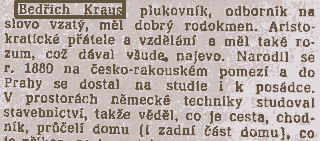
Augustin Knesl, , 1983
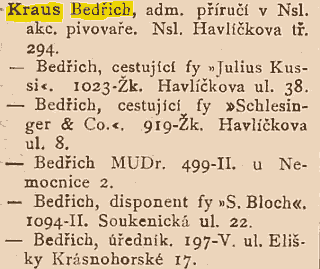
Seemingly Augustin Knesl is the only researcher that has made a serious attempt at identifying a model for the idiotic colonel. Allegedly he is inspired by a certain Friedrich Kraus who studied civil engineering at the German technical high school in Prague. This Kraus was born in 1880 and Knesl claims that he was a colonel and served at the Prague garrison. Knesl also maintain that Kraus had a mania for explaining the most obvious things.
Unfortunately Knesl's conclusions are unconvincing. As usual he naively accepts information from the novel as facts, and thus concludes that Kraus was a colonel in Prague. However no trace of such a colonel exist, be it in Schematismus (1914) or in the Prague address books. The closest are some reservists, but none of them served in Prague in 1914. Not even in k.k. Landwehr can any such officer be traced.
Friedrich Kraus was a quite common name, so Hašek may well have known a few of them, and there is good reason to believe that Knesl's engineering student actually lived. Apart from this there is little tangible information and the parallel to Knesl's write-up on Feldkurat Katz is striking: the researcher dug out a person with some similarities to the literary figure, but then assumed that additional information can be deduced from The Good Soldier Švejk.
A fellow student
One Kraus who Hašek may have known was Bedřich (Friedrich), a fellow student at the gymnasium in Žitná ulice from 1893 to 1896. This Kraus hailed from Karlín and studied five years above Hašek, so he would probably have been no more than a peripheral acquaintance.
Rector Řežábek
In the Hašek biography The Bad Bohemian, Cecil Parrott notes that rector of Obchodní akademie, Řežábek was detested by the author who targeted him in a scathing satire printed in Karikatury in 1908. Parrott observed that Řežábek, like colonel Kraus, demanded that "sub-ordinates" greet him already at distance and woe betide he who didn't!
Cecil Parrott: "The Bad Bohemian"
Režábek's insistence that the students should greet him from a long way off recalls Colonel Kraus von Zillergut in "The Good Soldier Švejk". Woe betide anyone who failed to notice him! The culprit was given a dressing down before the whole class and his crime was recorded in the class book. In addition his marks for good behaviour were slashed and he was led off to the Rector's office, where he got a second dressing down and his parents were told of his unheard of behaviour.
Quote(s) from the novel
[I.15] Plukovník Bedřich Kraus, mající též přídomek von Zillergut, po nějaké vesničce v Solnohradech, kterou jeho předkové prožrali již ve století osmnáctém, byl úctyhodným pitomcem.
[I.15] Scházela mu polovička levého ucha, kterou mu usekl jeho protivník za mládí v souboji kvůli prostému konstatování pravdy, že Bedřich Kraus von Zillergut je prachpitomý chlap.
[I.15] Před nadporučíkem stál plukovník Kraus von Zillergut. Nadporučík Lukáš zasalutoval a stál před plukovníkem, omlouvaje se, že neviděl.
[I.15] "Pane nadporučíku," hrozným hlasem řekl plukovník Kraus, "nižší šarže musí vždy vzdát čest vyšším. To není zrušeno.
Sources: CP, Augustin Knesl
Also written:Bedřich Kraus von Zillergut cz
Literature
 | Mannlicher, Ferdinand Karl Adolf Josef |  | ||||
| *30.1.1848 Mainz - †20.1.1904 Wien | ||||||
| ||||||
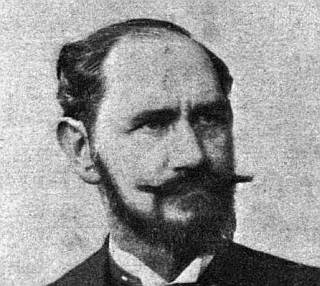

Nauka o střelbě, , 1908

, 23.1.1904
Mannlicher is indirectly referred to by the Mannlicher rifle, called manlicherovka in the novel. The theme here is Oberst Kraus who was obsessed with this rifle and therefore got the nickname "Mannlicher idiot" (Manlichertrottel).
Background
Mannlicher was an Austrian inventor and small armaments designer, best known for M1895, a series of automatically loading rifles that became the standard hand gun in k.u.k. Heer. The term manclicherovka refers to this gun. The most common version was Infanterie Repetier-Gewehr M1895. The rifles were produced in Steyr and later also in Budapest.
Mannlicher, who hailed from a family in Brüx (now Most) in Bohemia, moved with them to Vienna in 1857. Here he studied machine engineering and made a career as a railway engineer. In 1876 he travelled to Philadelphia for a railway equipment exhibition, and on the side he had a chance to study the patents of various small-arms designs. This was probably the impetus for his career as a small arms designer.
In 1879 his first design for an 11 mm repeater rifle was ready. It underwent several improvements over the next few years, until it in 1886 was introduced in k.u.k. Heer. Two years later the M88, with calibre 8 mm, was introduced, and several models followed until the flagship M1895 was introduced in 1895. Mannlicher also designed pistols and hunting guns. Mannlicher firearms were also widely exported. He is generally regarded as one of the greatest small arms designers in history.
Personal details
Mannlicher remained employed by the railways until 1887 when he finally took up a full position at the Steyr armaments factory, Österreichische Waffen-fabriksaktiengesellschaft. He was by now famous, repeatedly decorated, and in 1892 he was ennobled, choosing the name Ritter von Mannlicher. In 1899 he was awarded life long membership of Herrenhaus, the upper chamber of Reichsrat (the parliament of Cisleithanien). Mannlicher was married with two daughters. In 1904 he died of a heart attack, still only 55.
Hašek and "manlicherovka"
Mannlicher's famous rifle is mentioned by Hašek already in the story "Smrt Horala" (The death of Horal). It was published first in Národní listy on 8 April 1902 and also appeared across the Atlantic in Národní noviny, Baltimore, on 3 May. This was surely the first time ever that Hašek had a story published outside Bohemia.
Quote(s) from the novel
[I.15] Při přehlídkách pluku dával se do hovoru s vojáky a ptal se jich vždy jedno a totéž: „Proč se ručnici, zavedené ve vojsku, říká manlicherovka?“ U pluku měl přezdívku „manlichertrottel“. Byl neobyčejně mstivý, ničil podřízené důstojníky, když se mu nelíbili, a když se chtěli ženit, tu posílal nahoru velmi špatná doporučení jejich žádostí.
Literature
- Ausstellung in Philadelhia23.5.1876
- Auschließende Privilegien25.5.1882
- † Ferdinand Ritter von Mannlicher20.1.1904
- Das neue Infanteriegewehr26.2.1903
- Sterbefall23.1.1904
- Opakovačka (Manlicherovka) vzor 1888
- Mannlicher Ferdinand
- Mannlicher Ferdinand von
- Ferdinand Ritter von Mannlicher2001 - 2016
- Smrt Horala3.5.1902
 | Schiller, Friedrich |  | ||||
| *10.11.1759 Marbach - †9.5.1805 Weimar | ||||||
| ||||||

Schiller is mentioned because Oberst Kraus passed idiotic remarks when his officer colleagues talked about Schiller at a banquet.
Background
Schiller was a world-famous German composer, poet, historian and philosopher. He belonged to the Romantic era and was strongly associated with Goethe and Weimar. His full name his was Johann Christoph Friedrich von Schiller.
Quote(s) from the novel
[I.15] Týž spád řeči, táž zásoba největší naivnosti. Na jednom banketu v důstojnickém kasině plukovník Bedřich Kraus von Zillergut z čista jasna pronesl, když byla řeč o Schillerovi: „Tak jsem vám, pánové, včera viděl parní pluh hnaný lokomotivou. Považte si, pánové, lokomotivou, ale ne jednou, dvěma lokomotivami. Vidím kouř, jdu blíž, a ona to lokomotiva a na druhé straně druhá. Řekněte mně, pánové, není-liž to směšné? Dvě lokomotivy, jako by nestačila jedna.“
 | Poet Vierordt, Heinrich Wilhelm |  | ||||
| *1.10.1855 Karlsruhe - †17.6.1945 Triberg | ||||||
| ||||||
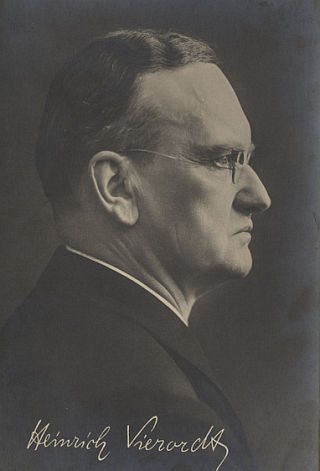

, 29.8.1914
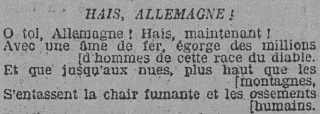
, 18.10.1914
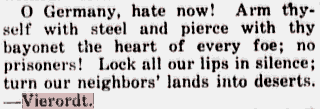
, 6.6.1918
Vierordt is mentioned when the author of The Good Soldier Švejk describes Oberst Kraus. The stupid colonel has ideas that align with those of Vierordt as expressed in a poem where he urges "Germany to hate and to slaughter millions of French devils with an iron soul". He is thus spiritually in line with the attitudes of the colonel who wanted to kill all prisoners, burn all Serbs and kill their children with bayonets. Hašek flawlessly translated two lines from the poem, whereas his introduction to it is less accurate.
Background
Vierordt was a poet from Karlsruhe who soon after the outbreak of World War I wrote an infamously bloodthirsty poem in ten verses: Deutschland, Hasse! (Germany, Hate!). From this poem, verse seven is no doubt the one that Hašek refers to in The Good Soldier Švejk. Vierordt otherwise wrote patriotic poetry and ballads, praising the virtues of his home area and his nation. After the Nazi take-over, he associated himself with the party and even wrote poems glorifying Hitler[1]. Vierordt was married and had one daughter. On his 50th birthday, he was awarded the title Hofrat.
A grotesque poem
The poem first appeared in Badische Landeszeitung[2] on 29 August 1914[d]. In October it was published as a single sheet title Deutschland hasse! Kriegsruf by Verlag Müller & Gräff in Karlsruhe and sold for the benefit of the Red Cross for 10 pfenning[b]. Best known are the last four verses that made the poem infamous and caught the attention both at home and abroad. These verses have later frequently been mentioned in articles and books that deal with the theme of war propaganda. The mentioned sheet probably contained only these verses.
Also in Austria the poem was printed and discussed, for instance by he newspaper Arbeiterwille in 1914 and 1915. The text published on the front page of this paper 25 November 1914 is an extract and differs slightly from the original. The same paper mentioned the poem again on 22 April 1915 and now clearly distanced itself from the content[a]. They might have done so already in November 1914, but as most of the surrounding text was removed by censorship, it is difficult to judge the context.
Objections
The poem was controversial from the beginning, even in Germany. It was eventually banned by German General Staff. The Red Cross in Baden refused to use it in its promotional material. Already in November 1914 it provoked a counter-poem named Deutschland, Hasse nicht![c].
Inevitably Vierordt's abnormal literary outburst was noticed abroad, notably in France where future Prime Minister Georges Clemenceau translated two verses and commented on them in his newspaper L'Homme enchaîné[e]. He dryly observed that Vierordt as late as the previous year had visited France and praised the country in glowing terms! Amongst others who reacted were the writers Karl Kraus and Erich Mühsam and the German pacifist/feminist Helene Stöcker.[f].
After the USA entered the war extracts of the poem were translated and appeared in some newspapers as an example of "Hun" bestiality and anti-culture. Already in 1915 it was partly translated and observed in the Dutch newspaper De Preangerbode[g].
Aftermath
The poem has also in recent times appeared in books that deal with war propaganda and is often emphasized as one of the most grotesque ones. The author himself had a street Vierordtstrasse named after himself in 1974, but in 2017 discussions were held about a possible renaming due to the author's war poetry. It was decided to keep the surname but rather associate it with his grandfather (1797-1867) of the same name, a local banker and benefactor.
Quote(s) from the novel
[I.15] Nebyl o nic horší než německý básník Vierordt, který zveřejnil za války verše, aby Německo nenávidělo a zabíjelo s železnou duší miliony francouzských ďáblů:Ať až k oblakům nad hory hromadí se lidské kosti a kouřící se maso.
Sources: Hans-Peter Laqueur, Georges Clemenceau, Johannes Werner
| 1. | "Du bist mehr als König und Kaiser / Du bist des deutschen Volkes Festzusammenschweißer" (1938). Ref. Werner, "Ein schreckliches Gedicht". |
| 2. | Some studies claim that the poem was published in Welt om Sonntag on 20 November 1914. In view of the above mentioned information this is obviously not true and moreover this date fell on a Friday (Hans-Peter Laqueur)! Nor have I have succeeded in identifying any newspaper named Welt om Sonntag from 1914. Ref. Werner, "Ein schreckliches Gedicht". |
Literature
- Ein Protest5.11.1914
- O, du Deutschland25.11.1914
- Über die Kriegsliteratur5.11.1915
- Heinrich Vierordt30.9.1915
- German Sentiments by German Writers10.8.1918
- Prussian Kultur and Bloody Savagery18.9.1918
- Die Vierordt-Ehrung im Rathaus5.10.1935
- Der Grab des Dichters30.10.1948
- Heinrich Vierordt (Dichter)
- Heinrich Vierordt
- Umstrittener Pate: Vierordtstraße sorgt für Diskussionen in Palmbach16.6.2017
| a | Kriegsgedichte | 22.4.1915 | |
| b | Ein interressanter Vortragsabend | 29.10.1914 | |
| c | Deutschland hasse nicht! | 14.11.1914 | |
| d | Deutschland, Hasse! | 29.8.1914 | |
| e | Hais, Allemagne! | Georges Clemenceau | 18.10.1914 |
| f | Ein schreckliches Gedicht | Johannes Werner | 1/2017 |
| g | Van den dag | 18.6.1915 |
 | Bagmaker Kuneš |  | ||||
| ||||||

The only bag maker in Spálená ulice in 1907.
Kuneš was a bagmaker in Spálená ulice, described by Švejk when he tries to explain the dog theft to the furious Oberleutnant Lukáš. bagmaker Kuneš had the habit of losing his dogs whereever he ventured.
Background
Address books from 1907 and 1910 do not show up any bag-maker bagmaker Kuneš in the Prague. There was a one person listed with this occupation in Spálená ulice No 35, but his name was Bohumír Vavroušek. In 1896 two bag makers were registered in the street but none of them were named Kuneš.
Quote(s) from the novel
[I.15] Ve Spálený ulici je nějakej brašnář Kuneš a ten nemoh jít se psem na procházku, aby ho neztratil. Vobyčejně ho nechal někde v hospodě nebo mu ho někdo ukrad nebo si ho vypůjčil a nevrátil
Literature
 | General von Laudon, Ernst Gideon |  | |||
| *2.2.1717 Ļaudona (Tootzen) - †14.7.1790 Nový Jičín | |||||
| |||||
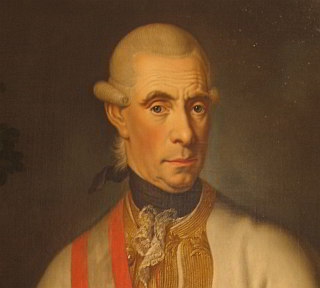
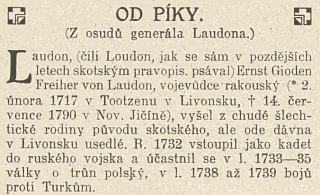
Rozkvět, 25.11.1911

,2.12.1914
Laudon is mentioned indirectly through the powerful expression Himllaudon that Oberleutnant Lukáš used when he verbally wiped the floor with Švejk after discovering that Max was stolen.
The same expresssion is used by Fähnrich Dauerling when he pesters the Czech recruits in 11. Kompanie. Feldoberkurat Lacina uses the expression Krucilaudon when he wakes up on the train to Bruck and doesn't know where he is.
His name reappears in the in the final chapter when the author describes Oberst Gerbich.
Background
Laudon was an Austrian field marshal of German Baltic origin, and one of the most successful Austrian commanders of the 18th century. He fought in the Seven Years' War, the War of the Bavarian Succession and wars against Turkey. His troops captured Belgrade in 1789.
Born in a family of nobles in current Latvia, Laudon first served in the Russian army before offering his services to Prussia where he was rejected. He had more luck in Austria but in the beginning he was assigned to the irregular troops of the infamous Baron von Trenck, the so-called Panduren. When these were dissolved he joined the regular army.
During the Seven Year War (1756-1763) his exploits in the campaign against Prussia made him famous. Many of the battles took place on Czech territory and this is no doubt the main reason for his legend status in the Czech lands. Here the well-known folk song Generál Laudon jede skrz vesnici bears his name and his fame lingers on in the expletive himmellaudon!, the very one that Oberleutnant Lukáš used in the novel.
Quote(s) from the novel
[I.15] „Švejku, dobytku, himmellaudon, držte hubu! Buď jste takový rafinovaný ničema, nebo jste takový velbloud a blboun nejapný. Jste samý příklad, ale povídám vám, se mnou si nehrajte. Odkud jste přived toho psa? Jak jste k němu přišel? Víte, že patří našemu panu plukovníkovi, který si ho odvedl, když jsme se náhodou potkali? Víte, že je to světová ohromná ostuda? Tak řekněte pravdu, ukrad jste ho, nebo neukrad?“
[II.2] Náš nejvyšší vojenský pán je taky Němec. Posloucháte? Himmellaudon, nieder!’
[II.3] Vrchní polní kurát prděl a krkal na lavici a hřmotné zíval na celé kolo. Konečné se posadil a udivené se tázal: "Krucilaudon, kde to jsem?"
Literature
 | Božetěch |  | ||||
| ||||||
Božetěch was a man from Košíře who specialized in stealing dogs and then claimed reward on the basis of newspaper ads from the owners of the missing animals. Švejk found it appropriate to mention this for Oberleutnant Lukáš in the midst of the severe reprimand he was subjected to after the senior lieutenant got to know that Max was stolen. Not to be confused with bookbinder Božetěch.
Background
Božetěch[1] is a very rare surname and is first and foremost found in Moravia. In 1910 not even a single person with this family name was listed in the Prague address directory.
1. Božetěch is more common as a first name than as a surname.
Quote(s) from the novel
[I.15] Nějakej Božetěch z Košíř, ten se jen tak živil. Ukrad vždycky psa, pak hledal v inserátech, kdo se zaběh, a hned tam šel.
 | Graf Folliot de Crenneville, Franz |  | ||||
| *22.3.1815 Sopron - †22.6.1888 Gmunden | ||||||
| ||||||
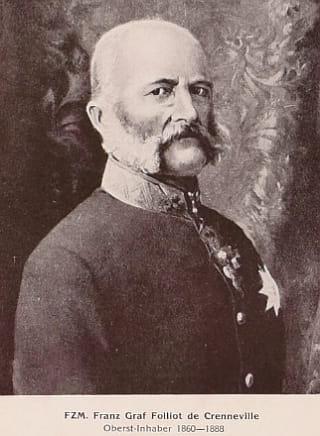
,1908
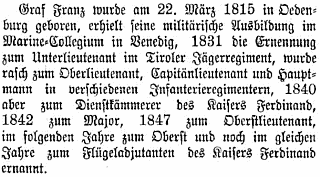
,10.8.1888
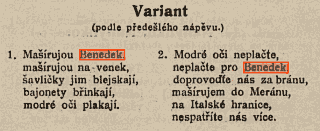
, 1914
Crenneville is mentioned in a song Švejk sings about Grenevil, who marched through Prašná brána.
Background
Crenneville was an Austrian count, Feldzeugmeister, Geheimer Rat, imperial Generaladjutant and Oberstkämmerer. He hailed from a renowned military family of French descent and entered the army as a boy. He became a lieutenant when he was only 16 and captain when he was 22. He distinguished himself in the wars against Italy and was repeatedly decorated. During the battle of Solferino on 24 June 1859 he was severely wounded. Between his military duties he also held a post at the court of Kaiser Ferdinand I. In 1860 he was named Inhaber[1] of Infanterieregiment Nr. 75.
Since retiring from active military service after Solferino, he was employed at the Imperial Court and was in charge of the imperial art collection. He remained a promoter of the arts throughout, even after his retirement in 1884. From this year until his death he lived in Gmunden. Crenneville was married and had three sons.
1. Regiments-Inhaber (regiment proprietor) was by 1880 a pure honorary title and the person had no function in the military command chain. His name would then appear attached to the standard name of an infantry regiment in the official Schematismus. Usually the "owner" was a higher military commander, a nobleman or a foreign monarch. The title was life-long.
The song
The song about Crenneville had already been introduced by Hašek in the stories Dobrý voják Švejk působí u aeroplánu (1911), Číslo patnáct (1912) and Povídka o pořádnem člověku (1914). Here the name is however spelt "Grenewil", Grenewill" and "Greenewill" respectively but there is no doubt that he refers to the same song.
Hašek thus managed to spell the name "Grenevil" in four different ways in four publications and it doesn't stop there. In 1968 Václav Pletka published the album Písničky Josefa Švejka (with a booklet of remarks attached). Here another variation is introduced. The name is "Grenevír" (which rhymes with špacír) and the rest of the verse is also altered (there is no reference to Prašná brána).
The source of Pletka's lyrics is unknown. Searches in the Czech National Library don't show a single hit on any of these variations but there are similar songs in the book Vojenský zpěvník (Army Songbook), published in 1914 by some captain Beran from Vysoké Mýto. In one of the songs, General Benedek seems to take the place of "Grenevil", a fact that is also mentioned by Pletka.
Quote(s) from the novel
[I.15] Nadporučík se odvrátil, vzdychl a uznal za vhodné místo se Švejkem obírat se raději bílou kávou. Švejk šukal již v kuchyni a nadporučík Lukáš slyšel zpěv Švejkův:
Mašíruje Grenevil Prašnou bránou na špacír, šavle se mu blejskají, hezký holky plakají.
Sources: Milan Hodík, Václav Pletka
Literature
- Franz Graf Folliot de Crenneville1877
- † Graf Franz Crenneville22.6.1888
- Feldzeugmeister Franz Graf Folliot de Crenneville-Poutet I.10.8.1888
- Feldzeugmeister Franz Graf Folliot de Crenneville-Poutet II.11.8.1888
- Folliot de Crenneville
- Vojenský zpěvník1914
- Dobrý voják Švejk působí u aeroplánuJaroslav Hašek28.7.1911
- Číslo patnáctJaroslav Hašek26.11.1912
- Povídka o pořádnem člověkuJaroslav Hašek1.1.1914



|
I. In the rear |
 | |
15. Catastrophe | |||
| © 2008 - 2024 Jomar Hønsi | Last updated: 16.4.2024 |


